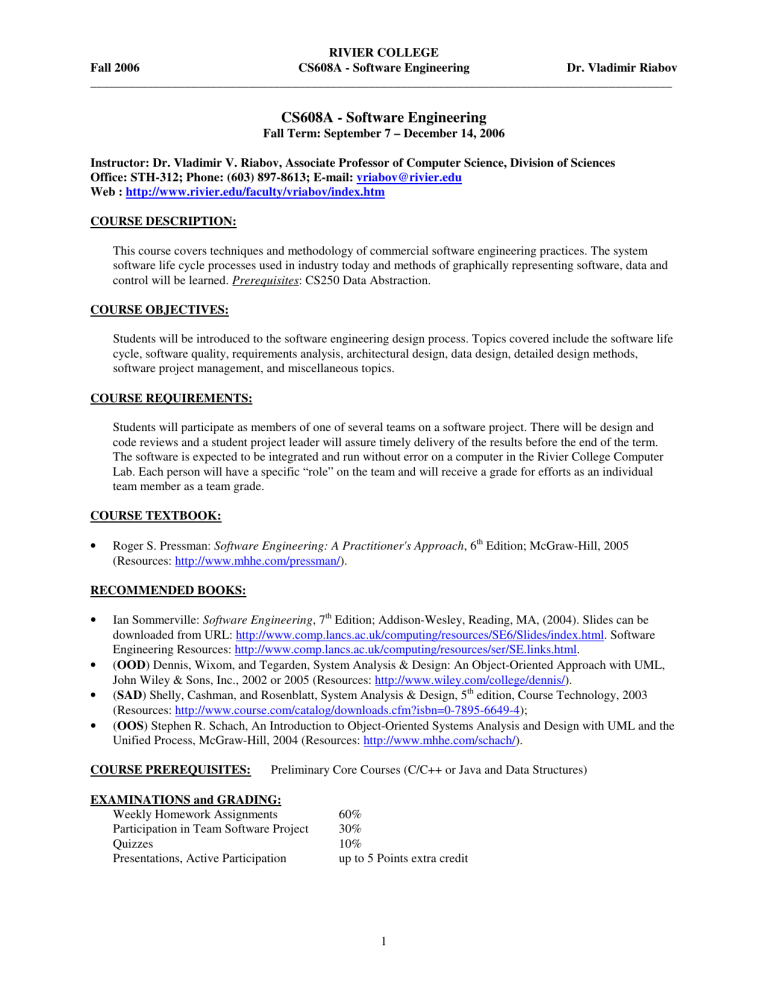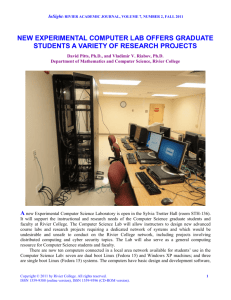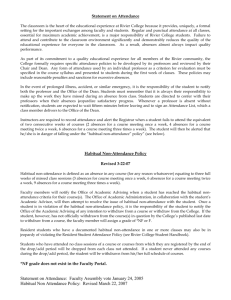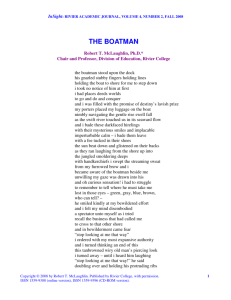
RIVIER COLLEGE Fall 2006 CS608A - Software Engineering Dr. Vladimir Riabov ____________________________________________________________________________________________ CS608A - Software Engineering Fall Term: September 7 – December 14, 2006 Instructor: Dr. Vladimir V. Riabov, Associate Professor of Computer Science, Division of Sciences Office: STH-312; Phone: (603) 897-8613; E-mail: vriabov@rivier.edu Web : http://www.rivier.edu/faculty/vriabov/index.htm COURSE DESCRIPTION: This course covers techniques and methodology of commercial software engineering practices. The system software life cycle processes used in industry today and methods of graphically representing software, data and control will be learned. Prerequisites: CS250 Data Abstraction. COURSE OBJECTIVES: Students will be introduced to the software engineering design process. Topics covered include the software life cycle, software quality, requirements analysis, architectural design, data design, detailed design methods, software project management, and miscellaneous topics. COURSE REQUIREMENTS: Students will participate as members of one of several teams on a software project. There will be design and code reviews and a student project leader will assure timely delivery of the results before the end of the term. The software is expected to be integrated and run without error on a computer in the Rivier College Computer Lab. Each person will have a specific “role” on the team and will receive a grade for efforts as an individual team member as a team grade. COURSE TEXTBOOK: • Roger S. Pressman: Software Engineering: A Practitioner's Approach, 6th Edition; McGraw-Hill, 2005 (Resources: http://www.mhhe.com/pressman/). RECOMMENDED BOOKS: • • • • Ian Sommerville: Software Engineering, 7th Edition; Addison-Wesley, Reading, MA, (2004). Slides can be downloaded from URL: http://www.comp.lancs.ac.uk/computing/resources/SE6/Slides/index.html. Software Engineering Resources: http://www.comp.lancs.ac.uk/computing/resources/ser/SE.links.html. (OOD) Dennis, Wixom, and Tegarden, System Analysis & Design: An Object-Oriented Approach with UML, John Wiley & Sons, Inc., 2002 or 2005 (Resources: http://www.wiley.com/college/dennis/). (SAD) Shelly, Cashman, and Rosenblatt, System Analysis & Design, 5th edition, Course Technology, 2003 (Resources: http://www.course.com/catalog/downloads.cfm?isbn=0-7895-6649-4); (OOS) Stephen R. Schach, An Introduction to Object-Oriented Systems Analysis and Design with UML and the Unified Process, McGraw-Hill, 2004 (Resources: http://www.mhhe.com/schach/). COURSE PREREQUISITES: Preliminary Core Courses (C/C++ or Java and Data Structures) EXAMINATIONS and GRADING: Weekly Homework Assignments Participation in Team Software Project Quizzes Presentations, Active Participation 60% 30% 10% up to 5 Points extra credit 1 RIVIER COLLEGE Fall 2006 CS608A - Software Engineering Dr. Vladimir Riabov ____________________________________________________________________________________________ CLASSROOM POLICIES: Any late assignments will receive a 10% grade discount. Assignments must be completed on time. Only those situations involving instructor’s permission will be exempt from this policy. Instructor must know in advance of class that a student will not be present or an assignment will be late. ATTENDANCE: The classroom is the heart of the educational experience at Rivier College because it provides, uniquely, a formal setting for the important exchanges among faculty and students. Regular and punctual attendance at all classes, essential for maximum academic achievement, is a major responsibility of Rivier College students. Failure to attend and contribute to the classroom environment significantly and demonstrably reduces the quality of the educational experience for everyone in the classroom. As a result, absences almost always impact the quality of performance. As part of its commitment to a quality educational experience for all members of the Rivier community, the College formally requires specific attendance policies to be developed by its professors and reviewed by the Division Head and Academic Dean. Any attendance policy used by an individual professor as a criterion for evaluation must be specified in the course syllabus and presented to students during the first week of classes. These policies can be found in respective course syllabi, and may include reasonable penalties and sanctions for excessive absences. In the event of prolonged illness, accident, or similar emergency, it is the responsibility of the student to notify both the professor and the Office of the Academic Dean. Students must remember that it is always their responsibility to make up the work they may have missed during an absence from class. Students are directed to confer with their professors when their absences jeopardize satisfactory progress. Whenever a professor is absent without notification, students are expected to wait fifteen minutes before leaving and to sign an Attendance List, which a class member delivers to the Office of the Academic Dean. Instructors are required to record attendance and alert the Registrar when a student fails to attend the equivalent of two weeks of courses (2 absences for a course meeting once a week, 4 absences for a course meeting twice a week, 6 absences for a course meeting three times a week). The student will then be alerted that he/she is in danger of falling under the ' habitual non-attendance policy" (see below). Habitual Non-Attendance Policy: Habitual non-attendance is defined as an absence in any course (for any reason whatsoever) equating to three full weeks of missed class sessions (3 absences for a course meeting once a week, 6 absences for a course meeting twice a week, 9 absences for a course meeting three times a week). It is the responsibility of the student to notify the College of any intention to withdraw from a course or withdraw from the College. The College will attempt to resolve the issue of habitual non-attendance with the student; however, the College reserves the right to withdraw students who are no longer attending classes. Habitual non-attendance in one or more classes may result in administrative withdrawal from the class or classes affected, withdrawal from the College or, in cases with extenuating circumstances, an administrative leave of absence. In such cases a grade of W of NF will be assigned to the classes affected according to the appropriate date published in the academic calendar. Students who have attended no class sessions of a course or courses from which they are registered by the end of the drop/add period will be dropped from each class not attended. If a student never attended any courses during the drop/add period, the student will be withdrawn from his/her full schedule of courses. HONESTY POLICY: Plagiarism and cheating are serious breaches of academic honesty. In general, plagiarism is defined as the presentation of someone else’s work in whatever form: copyrighted material, notes, film, art work, reports, statistics, bibliographies, and the like, as one’s own, and failing to acknowledge the true source. Quoting wordfor-word, or almost so, or using the argumentation of another source without acknowledging this dependence also constitutes plagiarism. Cheating is defined as the giving or attempting to give or to receive unauthorized information or assistance during an examination or in completing an assigned project. Submission of a single work for two separate courses without the permission of the instructors involved is also a form of cheating. 2 RIVIER COLLEGE Fall 2006 CS608A - Software Engineering Dr. Vladimir Riabov ____________________________________________________________________________________________ If students are unsure whether a specific course of action would constitute plagiarism or cheating, they should consult with their instructor in advance. Penalties for plagiarism and cheating vary with the degree of the offense and may take the form of the following academic sanctions: • the grade of F for the work in question; • the grade of F for the course; • notification of the department chair and/or Academic Dean of the College of the misconduct of the student; recommendations that the student be suspended or dismissed from the College. AMERICANS WITH DISABILITIES ACT (ADA): Rivier College wants to provide reasonable accommodations to students with disabilities. To accomplish this goal effectively and to ensure the best use of our resources, timely notice of a disability must be provided to the Office of Special Services for verification and for evaluation of available options. Any student whose disabilities fall within ADA should inform the instructor within the first two weeks of the term of any special needs or equipment necessary to accomplish the requirements for the course. To obtain current information on this procedure, contact the Office of Special Services at telephone extension 8497. 24/7 BLACKBOARD TECHNICAL SUPPORT: All students have the ability to access Blackboard technical support on a 24/7 basis. Students have many different options for obtaining support, including phone, online technical library, or Live Chat with a customer service representative. The support can be accessed by following this link: http://supportcenteronline.com/ics/support/default.asp?deptID=3250 COMPUTER LABORATORY: Students will be required to use computers in the Computer Lab for coding and testing the software. Since this is a team project all software must be available in a single place. The Lab equipment can be used between 9 a.m. and 10 p.m. If you have any problems with the equipment, contact Sister Martha’s office in the Computer Lab. COMPUTER LANGUAGES & TOOLS: UML, Java or C/C++ may be used. The ArgoUML tool is available in EDU-305 and STH-135 classrooms (or free on the Internet) and may be used for the team project development. The Project Team Leader will be responsible for assuring designers create “compatible” modules and properly link the modules. INSTRUCTOR AVAILABILITY: I will be available before and after class, during the office hours at my office (STH-312) and via telephone: (603) 897-8613 or E-mail: vriabov@rivier.edu (E-mail is a preferable form for communication). CLASS SCHEDULE: (Thursdays, 7:45 PM – 9:45 PM) Week 01 Date Sept. 7 02 Sept. 14 03 Sept. 21 04 Sept. 28 Subject Software & Software Engineering; Process Framework; CMMI Software Development Life Cycle, Process Models; Project Mgmt. System Engineering; Requirements, Specs. Analysis Modeling 3 Output from Class Form Project Teams Text Reading Chs. 1, 2 Team Project TOPIC Due Chs. 3, 21 Homework #1 Due Chs. 6, 7 ArgoUML Tool; Quiz #1; Functional Spec Due Ch. 8; Notes; ArgoUML Manual RIVIER COLLEGE Fall 2006 CS608A - Software Engineering Dr. Vladimir Riabov ____________________________________________________________________________________________ Design Engineering & Architectural Chs. 9, 10 05 Oct. 5 Homework #2 due; Design Functional Spec FROZEN 06 Oct. 12 Component-Level Design Quiz #2 Ch. 11 User Interface Design Ch. 12 07 Oct. 19 Homework #3 due 08 Oct. 26 Software Testing Strategies Design Spec due; Quiz #3 Ch. 13; Notes Software Testing Techniques Ch. 14; Notes 09 Nov. 2 Homework #4 due 10 Nov. 9 Software Metrics & Quality Design Rev Report due; Ch. 15; Notes Quiz # 4 (optional) Software Cost Estimating; Process & Chs. 22, 23 11 Nov. 16 Homework #5 due; Project Metrics Revised Design Spec FROZEN 12 Nov. 23 NO CLASSES NO CLASSES NO CLASSES Risk & Quality Management; Software Homework #6 due Chs. 25, 26 13 Nov. 30 Change & Evolution 14 Dec. 7 Re-Engineering; Configuration Project Status due (for Project Ch. 31; Notes Management Managers only) 15 Dec. 14 Team Presentations Software & Documents due; Software Accepted/Rejected 4



